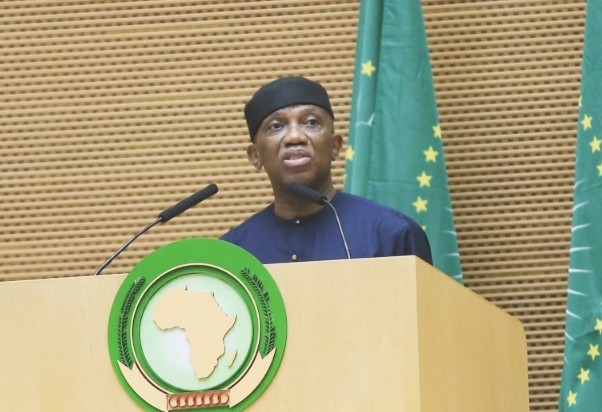By Matik Kueth
The African Union is increasingly positioning itself as the central force resisting what it sees as growing external power plays in the Sudan conflict, framing its leadership not just as mediation, but as a defense of African sovereignty amid competing global agendas.
Speaking at the launch of the “AU Journal on Reconstruction” in Addis Ababa on Wednesday, Bankole Adeoye, AU Commissioner for Political Affairs, stressed that the unfolding tragedy in Sudan must not be allowed to become a battleground for foreign influence.
He noted that AU must act as “the locomotive” of the peace process, making clear that only solutions built on the principle of “African solutions to African problems” can bring lasting stability.
Adeoye revealed a deepening strategic partnership between the African Union and the United Nations, championed by the UN Secretary-General’s envoy to Sudan, Ramtane Lamamra.
The cooperation aims to consolidate negotiations and prevent the scattering of peace efforts across multiple foreign-driven tracks.
European Union officials, watching the Sudan conflict destabilize a region critical to their own security and migration concerns, have thrown political and technical weight behind the AU-UN alignment, an unusual moment of consensus among institutions often divided on African crises.
These efforts are rooted in directives issued by the African Union Peace and Security Council (AUPSC), which has drafted a comprehensive roadmap that includes high-level engagement teams intended to pressure Sudan’s warring factions and civilian leaders back into a single political process.
Yet, even as the AU attempts to consolidate leadership, it faces resistance from parallel diplomatic fronts, notably the US-backed Quad Mechanism involving Saudi Arabia, Egypt, and the United Arab Emirates.
The Quad’s credibility has taken a hit in recent weeks, as Sudan’s government openly rejected the UAE’s role, accusing Abu Dhabi of supporting the Rapid Support Forces (RSF). The accusations have further strained the mechanism and strengthened the AU’s argument that non-African players are fueling mistrust rather than resolving it.
“We do not allow those who try to fuel the conflict,” he said, underscoring the AU’s insistence that any external interference, whether military, political, or economic, would prolong the war.
He reiterated the Union’s demands for an immediate ceasefire, space for Sudanese actors to engage in national dialogue, and a decisive end to impunity for those responsible for atrocities committed during the conflict.
But even as the AU asserts itself abroad, it faces pressure at home, as Sudanese civilian and political groups have criticized the Union for responding too slowly to a crisis now in its second year.
The AU’s recent flurry of activity, including plans for a presidential summit on Sudan, has been interpreted by some as an attempt to recover lost ground.
Adeoye also cautioned that war in Sudan war unfolding amid rising extremist threats across Africa.
The AU, he emphasized, must simultaneously curb terrorism, strengthen state security institutions, and prevent additional conflicts from erupting.



